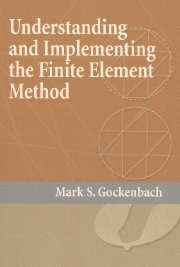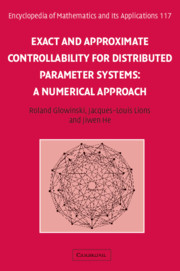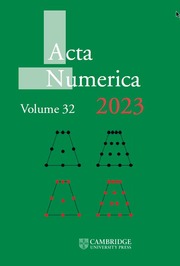Understanding and Implementing the Finite Element Method
The finite element method is the most powerful general-purpose technique for computing accurate solutions to partial differential equations. This book contains a thorough derivation of the finite element equations as well as sections on programming the necessary calculations, solving the finite element equations, and using a posteriori error estimates to produce validated solutions. Accessible introductions to advanced topics, such as multigrid solvers, the hierarchical basis conjugate gradient method, and adaptive mesh generation, are provided. Each chapter ends with exercises to help readers master these topics. The book is practical in nature. It includes a carefully documented collection of MATLAB programs implementing the ideas presented. Readers will benefit from a detailed explanation of data structures and specific coding strategies and will learn how to write a finite element code from scratch. Students can use the MATLAB codes to experiment with the method and extend them in various ways.
- Includes carefully documented collection of MATLAB programs
- Careful explanation of data structures and specific coding strategies and enabling students to learn how to write a finite element code from scratch
- Contains accessible introductions to advanced topics, such as multigrid solvers, the hierarchical basis conjugate gradient method, and adaptive mesh generation
Reviews & endorsements
'Upon completion of this book a student or researcher would be well prepared to employ finite elements for an application problem or proceed to the cutting edge of research in finite element methods. The accuracy and the thoroughness of the book are excellent.' Anthony Kearsley, National Institute of Standards and Technology
Product details
June 2006Paperback
9780898716146
392 pages
255 × 177 × 20 mm
0.654kg
This item is not supplied by Cambridge University Press in your region. Please contact Soc for Industrial & Applied Mathematics for availability.
Table of Contents
- Preface
- Part I. The Basic Framework for Stationary Problems:
- 1. Some model PDEs
- 2. The weak form of a BVP
- 3. The Galerkin method
- 4. Piecewise polynomials and the finite element method
- 5. Convergence of the finite element method
- Part II. Data Structures and Implementation:
- 6. The mesh data structure
- 7. Programming the finite element method: Linear Lagrange triangles
- 8. Lagrange triangles of arbitrary degree
- 9. The finite element method for general BVPs
- Part III. Solving the Finite Element Equations:
- 10. Direct solution of sparse linear systems
- 11. Iterative methods: Conjugate gradients
- 12. The classical stationary iterations
- 13. The multigrid method
- Part IV. Adaptive Methods:
- 14. Adaptive mesh generation
- 15. Error estimators and indicators
- Bibliography
- Index.







